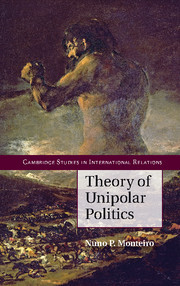Description
Theory of Unipolar Politics
Cambridge Studies in International Relations Series
Author: Monteiro Nuno P.
Theory of Unipolar Politics studies the durability and peacefulness of the post-Cold War international system.
Language: English
Subject for Theory of Unipolar Politics:
Approximative price 32.69 €
In Print (Delivery period: 14 days).
Add to cart
Theory of Unipolar Politics
Publication date: 04-2014
296 p. · 15.2x22.6 cm · Paperback
Publication date: 04-2014
296 p. · 15.2x22.6 cm · Paperback
Approximative price 74.83 €
In Print (Delivery period: 14 days).
Add to cart
Theory of Unipolar Politics
Publication date: 04-2014
296 p. · 15.2x22.9 cm · Hardback
Publication date: 04-2014
296 p. · 15.2x22.9 cm · Hardback
Description
/li>Contents
/li>Biography
/li>
Since the collapse of the Soviet Union, the United States has enjoyed unparalleled military power. The international system is therefore unipolar. A quarter of a century later, however, we still possess no theory of unipolarity. Theory of Unipolar Politics provides one. Dr Nuno P. Monteiro answers three of the most important questions about the workings of a unipolar world. Is it durable? Is it peaceful? What is the best grand strategy a unipolar power such as the contemporary United States can implement? In our nuclear world, the power preponderance of the United States is potentially durable but likely to produce frequent conflict. Furthermore, in order to maintain its power preponderance, the United States must remain militarily engaged in the world and accommodate the economic growth of its major competitors, namely, China. This strategy, however, will lead Washington to wage war frequently. In sum, military power preponderance brings significant benefits but is not an unalloyed good.
1. Introduction; 2. Conceptualizing unipolarity; 3. The scope of unipolar strategic choice; 4. The sources of competition under unipolarity; 5. Competition in the post-Cold War; 6. The sources of conflict under unipolarity; 7. Conflict in the post-Cold War; 8. Conclusion.
Nuno P. Monteiro is an Assistant Professor of Political Science at Yale University, where he teaches international relations theory and security studies. Dr Monteiro's research focuses on great power politics, power transitions, nuclear proliferation, the causes of war, and deterrence theory. His articles have appeared in International Organization, International Security and International Theory. Dr Monteiro's commentary on these and other topics has appeared in The Guardian, Foreign Affairs, The National Interest, and Project Syndicate, among other outlets. He is a research fellow at Yale's Whitney and Betty MacMillan Center for International and Area Studies and a member of the Scientific Council of the Portuguese International Relations Institute.
© 2024 LAVOISIER S.A.S.




